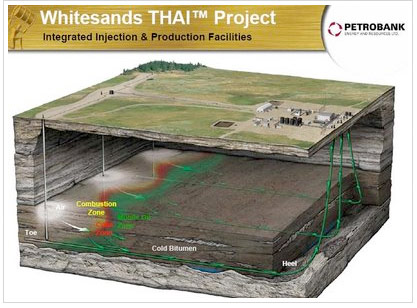Petrobank Energy and Resources has announced results from the world's first CAPRITM in-situ catalytic production well (P-3B) at our Whitesands project near Conklin, Alberta.
Petrobank drilled P-3B late in the second quarter of 2008 and completion operations commenced on the well in late July. This well has been designed to demonstrate the additional upgrading potential of our patented CAPRITM process which places an active catalyst bed between two concentric slotted liners. In laboratory tests, CAPRITM has achieved an upgrading effect of seven degrees API in addition to the upgrading effect resulting from the THAITM process. The P-3B well also incorporates our narrower slot design, intended to significantly reduce sand production from the McMurray sandstone reservoir typically encountered at Whitesands.
Since air injection and oil production commenced in August from P-3B, the well has been on continuous production, with no appreciable produced sand. Initial produced fluids consisted of oil and water emulsions from the steam preheat as well as residual drilling mud, which diminished as the well cleaned up. Recently we have achieved oil production volumes of up to 300 barrels per day on low air injection rates, with oil cuts of 40 to 50%. While it is still too early to determine the effectiveness of the catalyst, the produced oil has been upgraded to 11.5 degrees API due to the thermal cracking effects of the THAITM process. Currently P-3B is operating at a well bore temperature below the optimum range for the catalyst to be effective. We are presently increasing well bore temperatures up to 300 degrees Celsius for optimum catalyst efficiency and we will continue to analyze produced oil quality to assess the catalyst effectiveness. Produced gas analysis from P-3B is consistent with the P-1 and P-2 wells and indicates high temperature combustion with free hydrogen.
During the early startup phase of the P-3B well we have continued to operate the P-1 and P-2 wells at lower air injection rates. These wells have recently achieved high on-stream factors with oil production rates of up to 400 barrels per day for each well at a quality of approximately 12 degrees API, compared to the native 8 degree API bitumen in-situ. Now that P-3B production is stabilizing, we are gradually increasing air injection on all three wells, which is expected to result in further increases in fluid and oil production.
During August we also installed facilities to recover lighter oil that is currently being carried by the overhead gas stream as a vapor which is then condensing in the secondary separators. This lighter oil is over 30 degrees API and is not included in the production rates noted above. This lighter oil component further demonstrates significant in-situ thermal cracking and the potential for co-production of other high-value by-products.
It´s called the CAPRI system and it´s been designed to do the job of a refinery at the bottom of Petrobank´s patented THAI (toe-to-heel air injection) wells at the company´s pilot project near Christina Lake in northeastern Alberta. In the THAI system, an air pressure-driven combustion front loosens heavy oil as it slowly works its way forward, and the freed oil flows under gravity through slots in horizontal collector pipes, then is gas-lifted to surface processing systems.
For the CAPRI pilot, the horizontal pipes have been uniquely configured such that after passing through the slots, the hot crude will pass through a bed of catalyst and on through slots in a concentric inner pipe before being lifted.
The cracking to be achieved by CAPRI will be a step further in the upgrading process already occurring with THAI. With temperatures of over 600C, THAI has achieved coking, raising 8 API oil to 13 or 14 degrees.
Lab results have predicted a 7 API boost using CAPRI. This would the oil up to 20 to 21 API which would be almost as good as Mexican heavy oil. API 21 oil could get 80% of the price of Brent oil.
"Even with another two or three out of CAPRI, you´re getting significantly up the food chain in terms of oil quality," he says. In that minimum case, together with THAI, it means they´d be going from an 8-degree crude to a 16-degree crude. "With such a viscosity, it greatly reduces the need for a condensate," he says. "So there´s an economic advantage."
Once the THAI-CAPRI pair is working in concert, it will be a genuine self-contained underground refinery. "Basically, you´ve got the coker and the cat cracker [catalytic cracking]," says Bloomer.
Along with the efficiencies expected from the pair, Petrobank has complementary technologies it´s developing through its research and development facility, Archon Technologies, to run in parallel.
"We´re looking at a number of technologies," says Bloomer. "Enriched oxygen, sulphur recovery-taking the H2S and creating a solid sulphur product that is close enough to 100 per cent to be usable."

